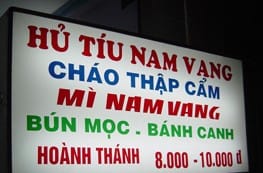
Reading signs and posters in Vietnamese*.
One of the greatest challenges facing you when travelling in this sphere of Chinese influence, is to be able to retrieve information from signs and posters, to the untrained eye they’re just a clutter of drawings, lines and dots and curls which means nothing at all to us.
This would also have been the case for Vietnamese were it not for the efforts of one man; The Jesuit Monk, Alexandre de Rhodes, who came here in 1624.
Without him, travelling in Vietnam would have been a lot more complicated.
When he landed in Vietnam he was determined to spread the Gospel, but faced an insurmountable obstacle; He was faced with Chinese writing and a spoken language almost as intricate. He later wrote:
“I have to confess that the first time I came here and heard the natives speak, it reminded me of the twitter of a bird and I lost all hope of ever being able to understand it.”
De Rhodes made up his mind to replace the Chinese characters with Latin letters. As he said: ”To the honor of God and to the benefit of the Vietnamese”
It took him 24 years, bent over books, but in 1645 as his work was nearing completion, the Vietnamese sentenced him to death. He cleverly escaped but two of his helpers were decapitated in his place.
His Latin – Vietnamese dictionary was published in Rome in 1651 and was praised as an important contribution to the advances of Christianity.
Eventually, the Vietnamese themselves realized the advantages of implying the Latin alphabet and the name Alexandre de Rhodes is forever written into history.
Thanks to him, travelling in Vietnam is a lot easier as the signs are far more readable here than in China.
Every now and then I send him a thought of thanks when travelling in Vietnam.
Many times though, I could have needed his assistance; Vietnamese is a very tonal language. A large number of words have different meaning depending on the intonation. For instance, theword “ma” can mean both: mother, rice, seed, grave, horse and ghost, ALL DEPENDING ON INTONATION.
Rhodes himself tells of the challenges he faced: “I once asked the cook to buy a fish, in Vietnamese cá and he happily returned with an eggplant cà. On another occasion I asked my servants to chop down some bamboo to take home, in Vietnamese:”chem tre”. One of the children overheard the message and white with terror, ran into the woods. I had just said: “Kill the Children!””
Alexandres solution to this problem was to indicate the intonation with little extra-signs and this means that written Vietnamese still often offers a lot of unfamiliar challenges.
It must be said, however, that a little English, a little pointing with fingers and a little body-language will get you a long way in Vietnam as the Vietnamese are very sociable people, especially in the south.
*Source: T. Faroviks novel: The Children of Buddha